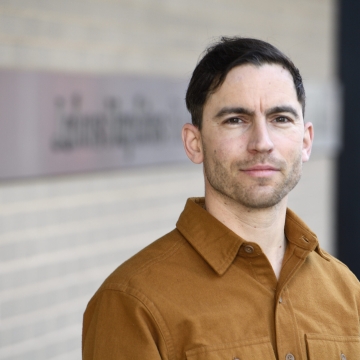Master of Science in Engineering (MSE) in Geography and Environmental Engineering
Offered By: Department of Environmental Health and Engineering (Whiting school of engineering)
Onsite | Full-Time | 9 months–1.5 years
About the MSE in Geography and Environmental Engineering Program
MSE students take classes and conduct research at the intersection of engineering and public health. People with this engineering degree go on to work in the engineering industry and study the areas of climate change, resource management, air and water pollution, data analysis, and environmental policy. This MSE degree is open to students with ABET-accredited undergraduate engineering degrees, or the demonstrated equivalent.
Request Information About Our Graduate Engineering Programs
Interested in learning more about Johns Hopkins Engineering’s graduate programs?
Click a link below to request more information.
MSE in Geography and Environmental Engineering Program Highlights
Customizable
Design your own curriculum
Multidisciplinary
Take courses in public health, business, and policy
Water & Climate
Use data analytics to address real world problems
Jensen Fellowship
6 months paid internship
What Can You Do With a Graduate Degree in Geography and Environmental Engineering?
Individuals with this degree go on to work as environmental engineers, data scientists, research or teaching professors, or PhD students. Meet one of our graduates.

Marcos Pascual, MSE '21
Marcos Pascual earned his MSE in Environmental Engineering in 2021. Marcos is working as a civil engineer for a company in Denver.
LEARN MORE
Concentrations
The Department's current concentrations in the MSE in Geography and Environmental Engineering are:
CONTAMINANT FATE AND TRANSPORT
Emphasizes understanding the physical, chemical, and biological phenomena that affect the movement and transformation of pollutants in the environment.
ENVIRONMENTAL PROCESS ENGINEERING
Involves the analysis and design of processes of water treatment, waste treatment, and environmental remediation, and includes a solid grounding in the chemical, biological, and physical principles underlying treatment and remediation technologies.
WATER RESOURCES ENGINEERING
Combines a solid grounding in environmental fluid mechanics and hydrology with electives in modeling, water development planning, policy, and contaminant fate and transport.
ENVIRONMENTAL MANAGEMENT AND ECONOMICS
Focuses on using models of physical and economic systems to analyze and improve the design of public policies and environmental control systems.
DATA SCIENCE AND ANALYTICS FOR ENVIRONMENTAL HEALTH AND ENGINEERING
Emphasizes innovative computational, statistical, and “big data” tools with applications to environmental problems in air pollution, energy systems, hydrology, and climate change.
Curriculum for the MSE in Geography and Environmental Engineering
This program is housed in the Whiting School of Engineering. Students can take classes in both the Whiting School and the Bloomberg School of Public Health.
You can find full details of this program in the academic catalogue. Explore the Whiting School of Engineering course offerings and Bloomberg School of Public Health course offerings.
Curriculum Overview
- Complete a minimum of 30 credits, of which at least 15 credits must be from departmental classes, following the chosen track curriculum
- Optional independent research project, submitted as a formal essay (typically adds one semester to time-to-degree)
- Take core classes on data analytics, fluid mechanics, and engineering management, such as Risk and Decision Analysis, Environmental Transport and Dispersion, Air Pollution, and Environmental Health and Engineering Systems Design
Home to Hopkins
Full-time students are eligible to take up to two online courses through the Engineering for Professionals program the summer before they start their full-time, residential master’s program. These courses apply to their master’s degree if satisfactorily completed. It’s a new, transformative way to earn your master’s degree!
Admissions Requirements
For the most updated general admissions requirements, please visit the Graduate Admissions page.
Standardized Test Scores
- The Graduate Record Examination (GRE) is optional.
- International students must submit either TOEFL or IELTS scores, or can apply for an English Proficiency Test Waiver.
Prior Degree
Applicants must have a bachelor’s degree from an ABET-accredited program or an equivalent program as determined by faculty review. Applicants who do not meet this requirement are encouraged to consider our Master of Science (MS) in Geography and Environmental Engineering.
Faculty Spotlights

Ben, the Theodore M. and Kay W. Schad Professor of Environmental Management, uses systems analysis and economics to improve electric utility planning, operations, and policy, as well as management of environmental and water resources systems.

Scot Miller combines satellite data and statistics to understand greenhouse gas emissions across the globe.

Carsten's research focuses on the occurrence and fate of organic contaminants in the urban water cycle and their impact on environmental and human health.

Sarah Preheim studies the microorganisms and environmental drivers of impairments to inland and coastal water bodies such as oxygen depletion and algal blooms.
Tuition and Funding
The Jensen Fellowship
The fellowship provides a full ride for engineers and scientists seeking to attain a Master's degree in Environmental Engineering from EHE. This fellowship is open to professionally-oriented master's students. Learn more about the Jensen Fellowship.
Which degree is right for you?
The department has a number of degrees to suit your educational and professional goals, background, and experience.
Master of Arts in Geography and Environmental Engineering (MA)
DURATION: 9 months to 1.5 years, full-time (onsite)
BEST FOR: Applicants who do not have a background in science or engineering but want to transition into the field
BOTTOM LINE: Designed to provide credentials for employment or additional education in environmental engineering
GOOD TO KNOW: The degree is completely flexible: you build your program from the ground up based on your educational background and professional goals
Master of Science in Geography and Environmental Engineering (MS)
DURATION: 9 months to 1.5 years, full-time (onsite)
BEST FOR: Applicants with a background in engineering, math, or science, but not from an ABET-accredited program
BOTTOM LINE: Prepares students for mid-level jobs in government and industry or additional graduate study
GOOD TO KNOW: Two broad concentrations in environmental science and environmental policy
Master of Science in Engineering in Geography and Environmental Engineering (MSE)
DURATION: 9 months to 1.5 years, full-time (onsite)
BEST FOR: Applicants with a degree from an ABET-accredited program in engineering or the sciences
BOTTOM LINE: Prepares students for mid-level jobs in government and industry or additional graduate study
GOOD TO KNOW: Four tracks to customize your curriculum according to your interests
Scot Miller, PhD
As program director, Dr. Miller sets expectations for what skills and knowledge the program's students must master and oversees curriculum development and program requirements. He connects students with professional organizations and offers career advice.

Contact Us
Questions about the program? We're happy to help.
EHE-Academics@jh.edu
